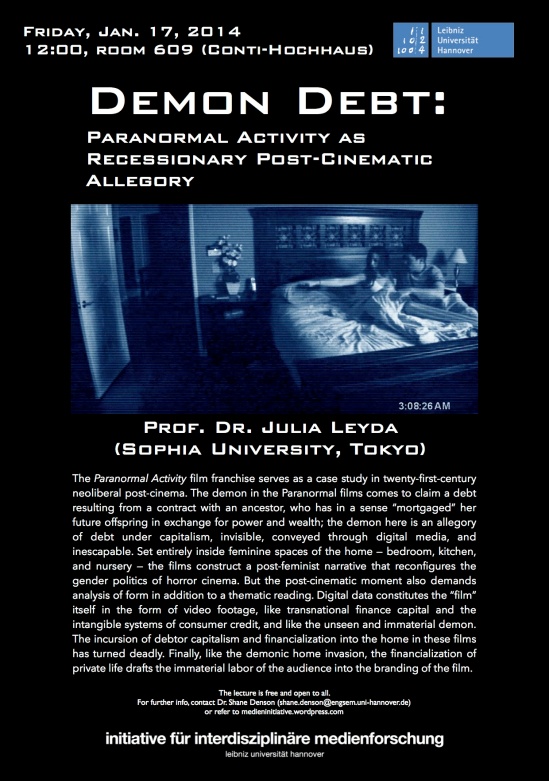I am pleased to announce that on Friday, January 17, 2014 (12:00 pm in room 609, Conti-Hochhaus), Prof. Julia Leyda from Sophia University in Tokyo will be giving a talk on “Demon Debt: Paranormal Activity as Recessionary Post-Cinematic Allegory.” The lecture will take place in the context of my seminar on 21st-century film, but attendance is open to all.
Julia Leyda has participated in the two roundtable discussions on “post-cinematic affect” that have appeared to date in the pages of La Furia Umana, and she served as respondent at SCMS 2013 on a panel that included papers by Steven Shaviro, Therese Grisham, and myself. Among other projects, she is currently collaborating with me on the preparation of an edited collection on “post-cinematic theory” that we hope to see published in 2014! (More details soon…)
Here is the abstract for her talk in January:
Demon Debt: Paranormal Activity as Recessionary Post-Cinematic Allegory
Julia Leyda
The Paranormal Activity film franchise serves as a case study in twenty-first-century neoliberal post-cinema. The demon in the Paranormal films comes to claim a debt resulting from a contract with an ancestor, who has in a sense “mortgaged” her future offspring in exchange for power and wealth; the demon here is an allegory of debt under capitalism, invisible, conveyed through digital media, and inescapable. Set entirely inside feminine spaces of the home — bedroom, kitchen, and nursery — the films construct a post-feminist narrative that reconfigures the gender politics of horror cinema. But the post-cinematic moment also demands analysis of form in addition to a thematic reading. Digital data constitutes the “film” itself in the form of video footage, like transnational finance capital and the intangible systems of consumer credit, and like the unseen and immaterial demon. The incursion of debtor capitalism and financialization into the home in these films has turned deadly. Finally, like the demonic home invasion, the financialization of private life drafts the immaterial labor of the audience into the branding of the film.
